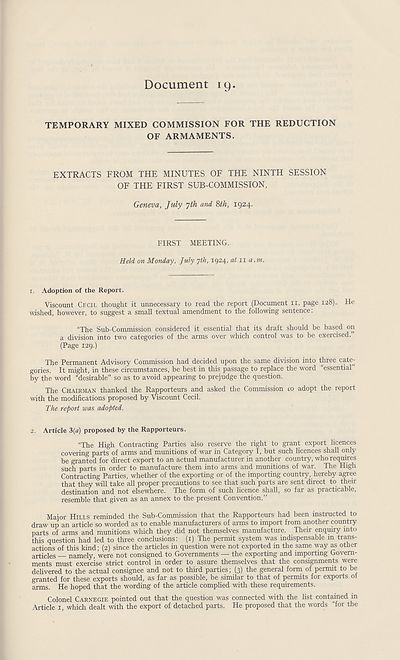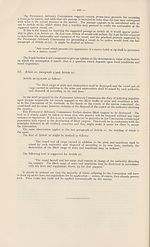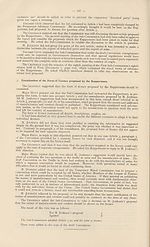Armament > Conference for the control of the international trade in arms, munitions and implements of war
(169)
Download files
Complete book:
Individual page:
Thumbnail gallery: Grid view | List view

Document 19.
TEMPORARY MIXED COMMISSION FOR THE REDUCTION
OF ARMAMENTS.
EXTRACTS FROM THE MINUTES OF THE NINTH SESSION
OF THE FIRST SUB-COMMISSION,
Geneva, July yth and 8th, 1924.
FIRST MEETING.
Held on Monday, July yth, 1924, at 11 a.m.
1. Adoption of the Report.
Viscount Cecil thought it unnecessary to read the report (Document 11, page 128). He
wished, however, to suggest a small textual amendment to the following sentence:
“The Sub-Commission considered it essential that its draft should be based on
a division into two categories of the arms over which control was to be exercised.”
(Page 129.)
The Permanent Advisory Commission had decided upon the same division into three cate¬
gories. It might, in these circumstances, be best in this passage to replace the word “essential”
by the word “desirable” so as to avoid appearing to prejudge the question.
The Chairman thanked the Rapporteurs and asked the Commission co adopt the report
with the modifications proposed by Viscount Cecil.
The report was adopted.
2. Article 3(a) proposed by the Rapporteurs.
“The High Contracting Parties also reserve the right to grant export licences
covering parts of arms and munitions of war in Category I, but such licences shall only
be granted for direct export to an actual manufacturer in another country, who requires
such parts in order to manufacture them into arms and munitions of war. The High
Contracting Parties, whether of the exporting or of the importing country, hereby agree
that they will take all proper precautions to see that such parts are sent direct to their
destination and not elsewhere. The form of such licence shall, so far as practicable,
resemble that given as an annex to the present Convention.”
Major Hills reminded the Sub-Commission that the Rapporteurs had been instructed to
draw up an article so worded as to enable manufacturers of arms to import from another country
parts of arms and munitions which they did not themselves manufacture. Their enquiry into
this question had led to three conclusions: (1) The permit system was indispensable m trans¬
actions of this kind; (2) since the articles in question were not exported in the same way as other
articles namely, were not consigned to Governments — the exporting and importing Govern¬
ments must exercise strict control in order to assure themselves that the consignments were
delivered to the actual consignee and not to third parties; (3) the general form of permit to be
granted for these exports should, as far as possible, be similar to that of permits for exports ot
arms. He hoped that the wording of the article complied with these requirements.
Colonel Carnegie pointed out that the question was connected with the list contained in
Article 1, which dealt with the export of detached parts. He proposed that the words “for the
TEMPORARY MIXED COMMISSION FOR THE REDUCTION
OF ARMAMENTS.
EXTRACTS FROM THE MINUTES OF THE NINTH SESSION
OF THE FIRST SUB-COMMISSION,
Geneva, July yth and 8th, 1924.
FIRST MEETING.
Held on Monday, July yth, 1924, at 11 a.m.
1. Adoption of the Report.
Viscount Cecil thought it unnecessary to read the report (Document 11, page 128). He
wished, however, to suggest a small textual amendment to the following sentence:
“The Sub-Commission considered it essential that its draft should be based on
a division into two categories of the arms over which control was to be exercised.”
(Page 129.)
The Permanent Advisory Commission had decided upon the same division into three cate¬
gories. It might, in these circumstances, be best in this passage to replace the word “essential”
by the word “desirable” so as to avoid appearing to prejudge the question.
The Chairman thanked the Rapporteurs and asked the Commission co adopt the report
with the modifications proposed by Viscount Cecil.
The report was adopted.
2. Article 3(a) proposed by the Rapporteurs.
“The High Contracting Parties also reserve the right to grant export licences
covering parts of arms and munitions of war in Category I, but such licences shall only
be granted for direct export to an actual manufacturer in another country, who requires
such parts in order to manufacture them into arms and munitions of war. The High
Contracting Parties, whether of the exporting or of the importing country, hereby agree
that they will take all proper precautions to see that such parts are sent direct to their
destination and not elsewhere. The form of such licence shall, so far as practicable,
resemble that given as an annex to the present Convention.”
Major Hills reminded the Sub-Commission that the Rapporteurs had been instructed to
draw up an article so worded as to enable manufacturers of arms to import from another country
parts of arms and munitions which they did not themselves manufacture. Their enquiry into
this question had led to three conclusions: (1) The permit system was indispensable m trans¬
actions of this kind; (2) since the articles in question were not exported in the same way as other
articles namely, were not consigned to Governments — the exporting and importing Govern¬
ments must exercise strict control in order to assure themselves that the consignments were
delivered to the actual consignee and not to third parties; (3) the general form of permit to be
granted for these exports should, as far as possible, be similar to that of permits for exports ot
arms. He hoped that the wording of the article complied with these requirements.
Colonel Carnegie pointed out that the question was connected with the list contained in
Article 1, which dealt with the export of detached parts. He proposed that the words “for the
Set display mode to:
![]() Universal Viewer |
Universal Viewer | ![]() Mirador |
Large image | Transcription
Mirador |
Large image | Transcription
Images and transcriptions on this page, including medium image downloads, may be used under the Creative Commons Attribution 4.0 International Licence unless otherwise stated. ![]()
| League of Nations > Armament > Conference for the control of the international trade in arms, munitions and implements of war > (169) |
|---|
| Permanent URL | https://digital.nls.uk/195383960 |
|---|
| Shelfmark | LN.IX |
|---|
| Description | Over 1,200 documents from the non-political organs of the League of Nations that dealt with health, disarmament, economic and financial matters for the duration of the League (1919-1945). Also online are statistical bulletins, essential facts, and an overview of the League by the first Secretary General, Sir Eric Drummond. These items are part of the Official Publications collection at the National Library of Scotland. |
|---|---|
| Additional NLS resources: |
|

